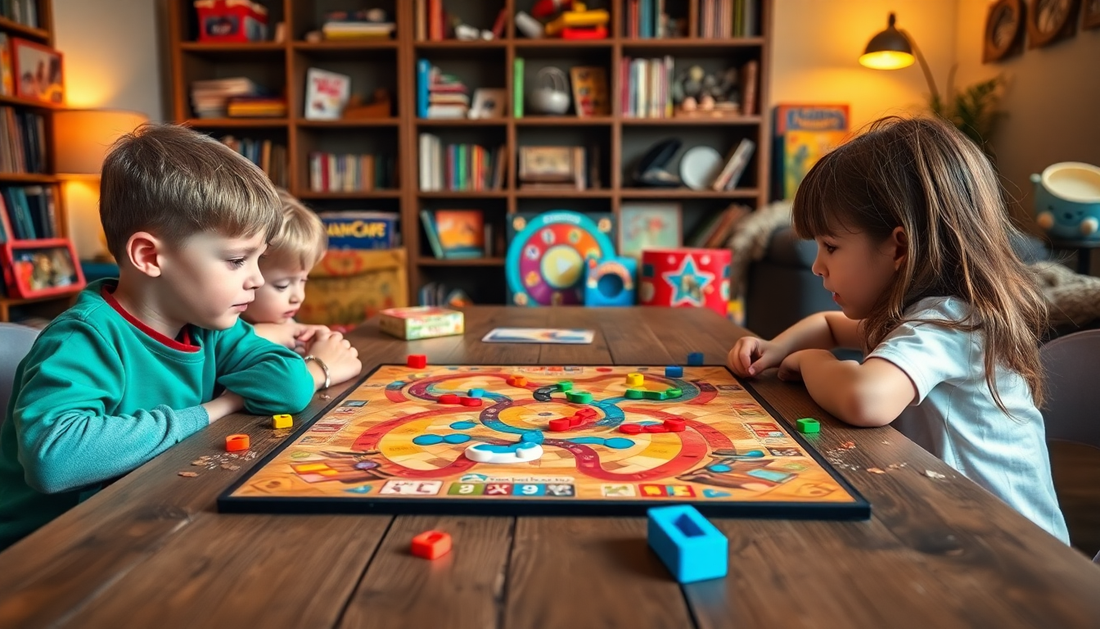In a world where technology dominates our daily lives, it's easy to forget the timeless joy and educational value of classic board games. As a parent, I've come to appreciate the profound impact that these simple yet engaging activities can have on my child's development. In this blog post, I'll explore how board games can cultivate essential skills like strategy, problem-solving, and critical thinking - all while providing endless hours of family fun.
The Power of Board Games
Board games have been a beloved pastime for generations, and for good reason. These interactive experiences offer a unique opportunity for children to engage their minds, hone their decision-making abilities, and learn valuable life skills. Unlike passive forms of entertainment, board games require active participation, encouraging players to think critically, anticipate consequences, and adapt to changing circumstances.
Developing Strategic Thinking
One of the most significant benefits of board games is their ability to nurture strategic thinking. As children navigate the game's rules and objectives, they must carefully consider their moves, weigh the potential outcomes, and devise a plan to achieve victory. This process of planning, foresight, and decision-making is a crucial component of strategic thinking, a skill that will serve them well throughout their lives.
Fostering Critical Thinking
In addition to strategy, board games also challenge children to think critically. Whether it's analyzing the game board, evaluating their opponent's moves, or identifying creative solutions to problems, these activities stimulate the mind and encourage a deeper level of engagement. By grappling with complex scenarios and making informed choices, children develop the ability to think independently, consider multiple perspectives, and arrive at well-reasoned conclusions.
Enhancing Problem-Solving Skills
Board games often present players with a series of obstacles and challenges that must be overcome. As children navigate these hurdles, they are forced to think creatively, experiment with different approaches, and learn from their mistakes. This process of trial and error, coupled with the need to adapt to changing circumstances, helps to cultivate essential problem-solving skills that are applicable in a wide range of contexts.
Choosing the Right Board Games
With so many board games available on the market, it can be overwhelming to choose the right ones for your child. When selecting board games, it's important to consider the age-appropriateness, complexity, and educational value of the game. Look for games that offer a balance of challenge and enjoyment, allowing your child to gradually develop their skills without becoming frustrated.
Age-Appropriate Games
It's crucial to choose board games that are suitable for your child's age and developmental stage. Younger children may benefit from simpler games with clear rules and straightforward objectives, while older children may thrive on more complex, strategy-driven games. By selecting age-appropriate games, you can ensure that your child remains engaged and challenged, without becoming overwhelmed.
Complexity and Difficulty
As your child's skills and confidence grow, you can gradually introduce more complex board games. These games may feature intricate rules, multiple objectives, or a higher level of strategic depth. By gradually increasing the difficulty, you can help your child develop their problem-solving abilities and critical thinking skills at a pace that is comfortable and rewarding.
Educational Value
When selecting board games, look for those that offer educational value beyond just entertainment. Games that incorporate themes related to history, science, or geography can provide opportunities for learning and exploration. Additionally, games that focus on specific skills, such as math, language, or spatial reasoning, can be particularly beneficial for a child's academic development.
Fostering Family Bonding
One of the most rewarding aspects of board games is their ability to bring families together. By engaging in these shared experiences, children and parents can forge stronger connections, build trust, and create lasting memories. Board game nights can become a cherished tradition, allowing families to unwind, laugh, and learn from one another.
Collaborative Play
Many board games encourage collaborative play, where players work together to achieve a common goal. This cooperative dynamic fosters communication, teamwork, and a sense of shared accomplishment. As children navigate the game's challenges alongside their parents or siblings, they learn the value of cooperation and the importance of considering the needs and perspectives of others.
Healthy Competition
While some board games are cooperative, others are inherently competitive. This friendly rivalry can be a powerful motivator, inspiring children to develop their strategic thinking and problem-solving skills. When managed appropriately, the competitive aspect of board games can teach children the value of sportsmanship, resilience, and gracious acceptance of both victory and defeat.
Quality Time Together
Board game nights offer a unique opportunity for families to unplug from the digital world and engage in face-to-face interaction. These shared experiences allow parents and children to disconnect from the distractions of everyday life and focus on the present moment, fostering deeper connections and strengthening family bonds.
Conclusion
In a world that is increasingly dominated by technology and digital entertainment, the humble board game remains a powerful tool for cultivating essential life skills in children. By engaging in these interactive experiences, children can develop strategic thinking, critical reasoning, and problem-solving abilities - all while enjoying quality time with their families.
As a parent, I encourage you to embrace the transformative power of board games and incorporate them into your family's routine. Whether you're playing classic favorites or discovering new and innovative titles, these timeless activities have the potential to unlock your child's full potential and create cherished memories that will last a lifetime.
So, gather your family, roll the dice, and embark on a journey of learning, laughter, and lifelong skills. The world of board games awaits!

